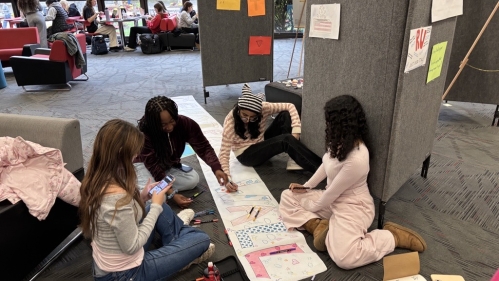Democracy in Action as Students Use Art to Express Their Hopes

The words “democracy” and “wall” might seem oppositional, but not on the campus of Rutgers University–Camden, where students worked together in building a “democracy wall.” Led by Simanti Lahiri, programming coordinator for public engagement, and in partnership with the Rutgers Democracy Lab, the wall displays students’ hopes during the run-up to Tuesday’s New Jersey gubernatorial election.
Using paints, paper, clay, and colored markers, students created posters and other hand-crafted expressions of what democracy means to them. The artworks are now on display in the main lounge of the Campus Center.
Two political science majors—senior Topher Abacan and first-year student Andrew Hoover—believe the exercise is a way to put their education into practice.
“We are taking what we learn to the public,” said Abacan. “Art is a great way to express the meaning of democracy.”
Hoover added that public engagement is a way to reinforce civil liberties. “Public awareness through freedom of expression is important,” he said.
The term “democracy wall” originates from an area of Tiananmen Square where activists hung posters during a period of political liberation known as the “Beijing Spring.” It now refers to any space where citizens can post comments, ideas, and protests about their government or society, thereby creating a free-speech zone.
The students wrote slogans such as “Love Unites Democracy,” “Use Your Vote!,” and “Democracy Is Revolution.”
Vick Cerini, a third-year business management major, said the democracy wall is a place to be yourself.
“This is supporting freedom for all, equality for all, and it is a place where our human rights can be strengthened,” Cerini said.
For Lahiri, the democracy wall is a place where big concepts can be expressed through the tools of everyday life.
“We have students writing on flip charts about what day-to-day democracy means to them,” Lahiri said. “This is a safe place for self-expression.”


